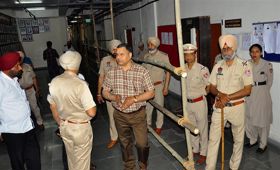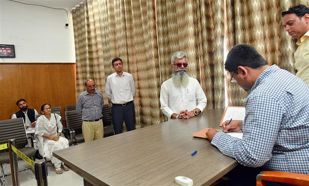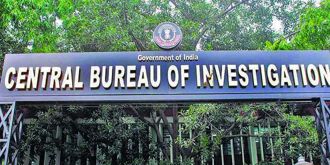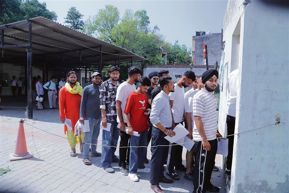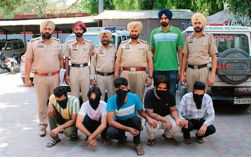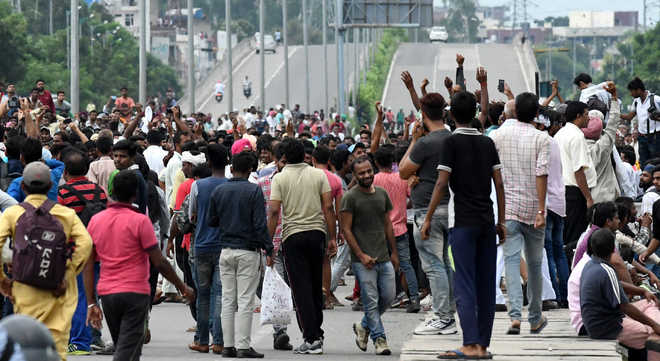
Dera Sacha Sauda followers on the Kalka-Zirakpur highway at Panchkula. While the godmen might lead the gullible, it is our blind faith that makes them exploit our sentiments. TRIBUNE PHOTO: NITIN MITTAL
SANDEEP SINHA
Fiat justitia ruat caelum (Let justice be done though heavens fall)! This law school maxim seems to be the prevailing sentiment after the court verdict on the Dera Sacha Sauda chief Gurmeet Ram Rahim in a rape case after his followers ran amok in Panchkula and left the beautiful township scarred after the mayhem. Wanton destruction not only took a toll of life and property but also raised question marks over the handling of the situation.
That religion and politics can be a heady but dangerous cocktail keeps manifesting itself from time to time and the Dera was an intrinsic part of it.
While working in Bathinda — where the sect has its Punjab headquarters at Dera Salabatpura — soon after the flare up in 2007 after Gurmeet Ram Rahim allegedly imitated the tenth Sikh Guru — the volatile reactions that the Dera evoked was frequently on display.
In the months and years after the 2007 incident, clashes between Sikh groups and the followers of the sect were common. While the Dera followers would insist that their Naam Charcha was peaceful, the radical Sikh groups insisted on shutting down the Dera Salabatpura where the 2007 incident reportedly took place. Tension would flare up over the holding of naam charcha in areas like Goniana and a life was lost in a clash at Dabwali. There was also a bid to eliminate a Dera manager.
The radical Sikh groups would despatch jathas from Takht Sri Damdama Sahib in Talwandi Sabo to Salabatpura demanding that it be shut down and the police would take them into custody at Bhai Rupa, 10 kms away, to prevent their entry.
Along with colleagues, I once visited Salabatpura during a jatha march. The routes were sealed and the Dera was out of bounds.
We then headed to Takht Damdama Sahib from where the jatha led by the radical Sikh leader Baljit Singh Daduwal was to leave for Salabatpura. Amid cries of “Bole So Nihal”, the jatha left only to be taken into custody some distance away.
I later had an interesting phone conversation with Daduwal when he called up to object over the removal of the word “Sant” before his name in the news reports. I explained to him that the style sheet of the paper did not permit the use of honorifics. But he insisted, “Main ek MA pass banda rakhya hoya, jo mainu angrezi akhbar padhke sara kuch das da,” (I have hired an MA qualified person to read to me what is being written about me). He then asked me how I would have reacted in his position? I laughed off the query. There was a more potent example of how religious and caste sentiments are a recipe for trouble. The local pull-out of this paper had carried a report about water scarcity in the city. It referred to a locality as “Banbhattyan Da Mohalla”, its old name, instead of its new name Guru Nanakpura.
I started getting calls from 6.30 in the morning about the report being derogatory and that it had caste overtones.
Unable to fathom what had gone wrong, I tried to explain that the report was only about water scarcity.
But the calls refused to cease. “Assi 500 bande gurdware te jama ho rahe ne,” (500 people are assembling in gurdwara), I was told.
We held our ground but the anonymous callers insisted on an apology. We did not relent. At night, we were giving finishing touches to the pages when we received a call from the head office.
The anonymous callers were aware that we were not carrying the apology and had threatened further action. We were told to carry a clarification and end the matter.
The next day, the police rounded up the callers. “Tussi taan khabar padhi hai,” (have you read the news), the inspector asked, waving the newspaper in his hand. They nodded in the negative. They had not read the news.
The matter ended but it showed how things were —people got worked up over a report they had not read. They had reacted just because somebody had told them it was derogatory, and then worked themselves into a frenzy, threatening the staff. It is an example of how the herded mob works.
It was normal to receive a call for the coverage of an event where the son of Jarnail Singh Bhindranwale was to be felicitated or from someone like Simranjit Singh Mann, who in his impeccable English, would say how unhappy he was about the crowd strength at his rally mentioned in the report.
The mix of religion and politics shows balance and caution remain key words. Religious sentiments can get hurt as Arvind Kejriwal found when his manifesto showing the party symbol broom in the backdrop of Golden Temple was released and he performed sewa to atone.
The bandh call by panthic organizations in support of clemency for Balwant Singh Rajoana, and the sheer nature of posters on car windscreens on that day, indicated that peace is fragile and maintaining it needs foresight and acumen.





















